
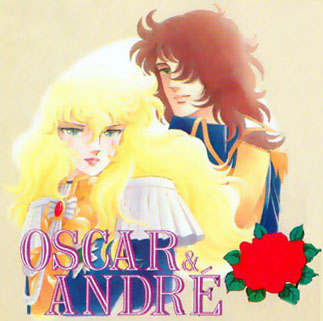
In keeping with KAEL's effort to review more classic anime titles, it's only a matter of time before we turn our eager eyes on the mother of all shoujo: THE ROSE DE VERSAILLES. Don't let its girly genre turn you off. All three of the guys at KAEL were hooked, hooked on this engrossing tale about a very extraordinary young woman living in a very extraordinary time. During the two days it took us to finish all 40 episodes, we couldn't pop fansubs into the VCR fast enough. ROSE is shoujo at its best: well-written and addicting as hell. Created in manga form by the incomparable Ikeda Riyoko in 1972, ROSE went on to spawn an anime in 1979 (yes, it's that old and that good), a traveling play (with an all-female cast), and a live-action movie (produced in English!). All of which makes this anime a high watermark for its genre. REVOLUTIONARY GIRL UTENA would not be the show that it is today had it not been for ROSE. To say that it blatantly plagiarized this 20-year-old classic would be an understatement. 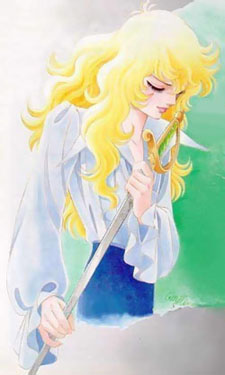
Half soap opera, half history lesson, ROSE tells the fascinating story of a young woman living in 18th century France, spanning the 20 years prior to the French Revolution. She is only so fascinating because she was raised as a man, and led a life as a man. Named "Oscar" by her heirless father, she was forced into a military career at the tender age of 14 when King Louis XV appointed her Royal Guard Commander for the Royal Family. The fact that a 14-year-old girl was chosen as the Royal Guard Commander is quite unbelievable, but Oscar's steely character - wise beyond her time and age - makes it perfectly believable. During a time when women had no careers, she was able to succeed in the military - of all places - like no other. While it was no mystery that she was a woman, Oscar did many things other women could not. And she got away with it only because she did it better than many men. Through Riyoko's mastery storytelling - weaving historical fact with fiction (the character of Oscar is all fiction) - we are able to follow Oscar's life from the Court of Versailles, where she protected Marie Antoinette as a Royal Guard, to the turbulent streets of Paris, where she went on to command the French Guards at the dawn of the French Revolution. Aside from giving us an original character in Oscar, Riyoko also does a damn good job of humanizing the various historical characters surrounding our fictional heroine, especially Antoinette, whose gruesome death during the Reign of Terror is common knowledge. This foreboding fact gives the story - as it slowly unfolds her fate up to the guillotine - a tragic undertone unlike any shoujo I've seen. 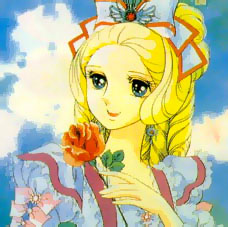
ROSE begins innocently enough, at the turning point of two lives: one destined to become the last queen of France, the other destined to serve her. Marie Antoinette and Oscar François de Jarjeyes are respectively introduced as tomboyish 14-year-olds with their whole lives ahead of them. The former is an Austrian princess, a little spoiled but bred with grace and dignity as befitting her royal heritage. Contrarily, the latter is a young French noble, raised to compliment her beauty with education and fencing skills as befitting the young men of her times. Though polar opposites in terms of personality and breeding, both of their lives will change drastically in the year 1769, and neither will have a say in the matter. In order to procure peace between Austria and France, Antoinette has been arranged to wed the Crown Prince of France Louis XVI. And Oscar has been chosen as her Royal Guard. While Antoinette accepts her fate like any other 14-year-old, with fright and wonder, Oscar almost defies the King's order to preserve her freedom. Never the fool, Oscar knows she can never live her life as a woman being the Queen's bodyguard. But never the coward, she bravely accepts her fate, abandons her femininity, and embarks upon a life of "glory and passion" few can live up to. From here on the series will chronicle the lives of these two young women for the next 20 years; from Marie Antoinette's marriage with Louis XVI to the French Revolution. You can imagine the amount of drama covered by those two decades - and the show gives you plenty of it - but to my surprise, ROSE never feels like a soap opera. For one thing, much of the dialogue is very well-written, and soap operas are known for bad writing. I was expecting for someone to say something stupid, but no one ever did (well, Antoinette does get a bit flighty sometimes but she's not the main character). Not only that, much of the romance within this series is handled with a remarkably light touch, almost as if the producers restrained themselves for fear of laying it on thick. But that doesn't mean there is no passion, because there is plenty to spare. Hey, I'm always a fan of shoujo love scenes, especially when it's handled with maturity. I'm also a fan of good storylines, and ROSE is teeming with captivating - often unpredictable - plots. From episode one on, the drama just doesn't stop. I will not even attempt to elaborate because I'll just be scratching the surface. Those who have seen this series know what I'm talking about, those who haven't should rush to find out. Let's just say every character (good and bad) - and there are many - gets a well-crafted story to their name. Riyoko is one skillful juggler: considering how many plots there are, she does a thorough job on every one, and they all fit remarkably well together without ever feeling contrived. Not only are these story arcs enthralling to watch, a lot of them do a damn good job of pulling the heart strings, even on a jaded Gen-Xer like me. Believe me, all of this is so refreshing after my experience with the sophmorish schmaltz-fest that is FUSHIGI YUUGI. 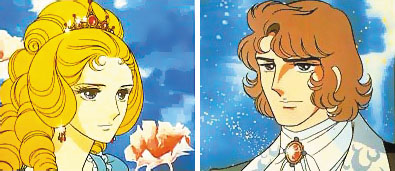
Perhaps the biggest reason ROSE seems to transcend your typical melodrama would be its historical setting and strong cast of characters. By incorporating real people and events into the story, Riyoko has half her work cut out for her. Marie Antoinette's life was rife with affairs, rivals, loneliness, mistakes, and tragedy. What could be easier than translating those events into manga? Well, apparently that's too easy for Riyoko. Because she invents a slew of original characters, each with a story of their own. Foremost among them is our heroine Oscar, who is arguably the most complex and kick-ass woman created in any anime. Though forced to live her life as a man, Oscar is still every bit a woman. She's just a woman way ahead of her time: educated, outspoken, successful, and a damn good fencer. Storywise, Oscar's transgender lifestyle gives the show much of the lesbian overtones that the guys at KAEL were particularly fond of. Utena tries but doesn't come close to filling her shoes. Oscar aside, Riyoko breathes life into a whole world of personalities.
Among actual historical characters, there are: Marie Antoinette, our ill-fated
queen; her lover Hans Axel von Fersen,
the Swedish playboy who also steals Oscar's heart;
Madame DuBarry, King Louis XV's conniving mistress; Madame Polignac,
Antoinette's deceptive friend;
Jeanne, the con-artist who spawns the infamous Diamond Necklace Scandal;
and Rosalie, a poor girl who suffers much in this
story but ends up as one of the few characters to get a happy ending. I was pleased
that all of these characters are well fleshed-out beyond their textbook
counterparts. In history, Rosalie is only known as Antoinette's
waiting girl right before her execution. But in ROSE, Riyoko gives Rosalie
a whole life story. Not only is this embellishment the fulcrum of several
very good story arcs, Rosalie also serves as a link
to the common French folk (a stand-out among the cast of royalty and nobles).
Through her character (and a few others),
the viewer comes to understand the rage and desperation behind the conception of the
French Revolution. Storytelling may be Riyoko's main goal,
but she also goes out of her way to
incorporate as many historical details into the plot as she can.
The French Revolution may cap off this story with a bang, but Marie Antoinette's life remains the focus throughout, and much of it is told through Oscar's perspective. From their initial encounter before Antoinette's arrival in France, Oscar will develop a deep and loyal friendship with the future queen. Her fencing skills and educated mind is just what the young princess needs as protection and guide. But Oscar can only do so much for the impressionable Antoinette, who is weak-minded and easily duped. Antoinette does mature from an airheaded princess to a regal queen, but she never comes to understand her responsiblity to France. During her reign as Queen, she makes mistake after mistake. I can't exactly blame her considering the circumstances, but many of her actions are eye-rolling-ly bad. And they do catch up with her on the guillotine. In comparison, Oscar is Antoinette's polar opposite. Unlike the fragile queen, Oscar makes the most of her circumstances. She takes pride in her military position, she offers kindness to others, and she's not afraid to stand up for her beliefs. While impulsive, she is never stupid. Her introspective nature is particularly welcome in a shoujo heroine. All told, Oscar is the ideal that Antoinette can never be. Despite her nobility, Oscar will come to understand the plight of the French people in ways that Antoinette can not, and finally lead the French Guards to fight on the side of the Revolution. Oscar's only flaw is her silly crush on Fersen. Not only is it totally out of character - she actually wears a dress for this guy - but he is so not worth it. 
Someone more worthy of Oscar's affection is her life-long friend and servant André. Every shoujo heroine needs a handsome man to faithfully and selflessly love her; André does that and more. But unlike so many typical shoujo love interests, André does not suffer from a bland personality. In fact, his character gives the end of this series much of its poignancy. How does it feel to serve the woman you love, and hide your feelings for her sake? Even though André is a man, he is socially below Oscar's noble class. To ask her to love him would be asking her to lower her class. That's not to mention Oscar does not love him (or so she thinks), and has always considered him as a friend only (the dreaded F-word for nice guys). But Oscar and André are made for each other. Everyone knows it except her. André's level-headed reasoning perfectly counteracts her hot-headed temper. He is the one staple in her life, helping her through all the trials she endures as the only woman living in a man's world. A more patient and understanding man I have never seen. It's a pleasure to watch André's feelings for Oscar slowly surface - and explode in one cathartic episode - as the two mature from teenages to adults. But it's equally heart-wrenching to see André change from a jovial friend to a serious lover, considering how cruelly Oscar dismisses him when she finds out about his feelings. In spite of unimaginable odds, such as Oscar's infatuation with Fersen (of all losers) and his own impending blindness, André maintains his love (this selfless devotion is summarized beautifully in the lyrics of the ending song). I have to say that his inhuman level of patience and persistence is quite frustrating to watch sometimes. Oscar just does not know how lucky she is to have such an endearing beau. But all the persistence does pay off, and the most satisfying part of this series is when Oscar finally wise up and reciprocates André's love (circa episode 37, I told you he's patient). Despite the fact that their romance is tragically short-lived, it's still well worth the wait. 
Considering the age and production value of this anime, I'm happy to report that it has aged remarkably well. Although the animation is limited and crude, it's never distracting. And unlike REVOLUTIONARY GIRL UTENA, repetitions are used sparingly, and most of the fight scenes actually have bite. The animators cleverly emphasizes cinematics rather than movement to make the most of plot and atmosphere. In a world so rich in history and romance, you don't really need fluid animation to become absorbed in the story it tells. That said, this show still has a lot more action than your typical shoujo. The character designs are notably realistic: those long faces and mascara-ed eyes take some getting use to. But such designs make perfect sense in a period drama. Also in place is a good old-fashioned score to heighten the emotional impact of every scene. Background music aside, I totally love the way every episode is bookended by two ballads - of Oscar and André respectively, both of which "explain" their characters in beautiful melodies. The story of ROSE is not a light one. It's serious with a straight face. What do you expect when it all ends with the French Revolution? Just look at the self-sacrificial finalés of LES MISÉRABLES and A TALE OF TWO CITIES. While the inevitable fate of Marie Antoinette should be no surprise, the viewer will be curious to see how Fersen, Oscar, and André - among many others - fare in the conclusion. Without giving anything away, I must say that everyone gets what they deserved, and the tone of the story remains consistent throughout. While I wasn't happy - make that downright tearful - about the fates of some characters, I have to admit everything happened because they should happen. There is a certain poetic beauty and fierce dignity in even the most sorrowful outcomes. It's good to see that Riyoko chooses the right ending for the story's sake, even if it's not a happy one. She certainly had me grabbing for the Kleenex while asking myself: what is it about the French Revolution that inspires such good stories?
|

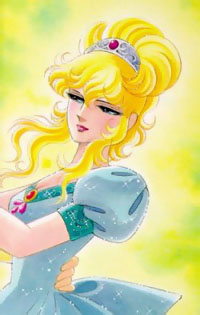 The Diamond Necklace Scandal and the Estate General are prime examples, since
they must be included in any story concerning the French Revolution. Even
revolutionary leaders
like Maximillen Robespierre and Louis Antoine de St. Just get honorable mentions along the way.
The Diamond Necklace Scandal and the Estate General are prime examples, since
they must be included in any story concerning the French Revolution. Even
revolutionary leaders
like Maximillen Robespierre and Louis Antoine de St. Just get honorable mentions along the way.
